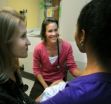(Press-News.org) AUGUSTA, Ga. – A simulated clinical experience guiding future pediatricians through interactions with breastfeeding moms appears to put the doctors at ease with the sensitive and important health topic, researchers say.
"We showed that their confidence and comfort increased with the OSCE (Objective Structured Clinical Examination) interventions," said Dr. Kathryn McLeod, a pediatrician and educator at the Medical College of Georgia at Georgia Health Sciences University who developed the three simulated patient exams.
Breastfeeding education typically falls to pediatricians who often see mothers and babies several times before a baby is six months old. "Our residents have book knowledge about breastfeeding but they do not have hands-on knowledge on how to help mom's breastfeed," she said. "It's an embarrassing examination for a lot of residents, especially males, watching moms breastfeed infants." It can be embarrassing for moms to ask for help as well, McLeod said.
In the OSCEs, pediatric residents interacted with moms who'd been taught to model three common breastfeeding obstacles: sore nipples, a perception of a poor milk supply and a jaundiced baby. The moms gave residents immediate, face-to-face feedback on their history-taking, style, skill and professionalism. Training was first given in the second year then repeated in the third year.
The experience increased residents' self-reported confidence in helping mothers breastfeed, going from 18.1 to 22 points out of a possible 25 Breastfeeding Attitudes and Behavior assessment score. While their comfort level dipped in the interim, the second course in their third and final year of residency re-boosted the score to 22.2. A second group of residents receiving the more traditional lecture and video in their first and second year experienced a smaller confidence boost.
The findings were reported in a poster presentation at the American Academy of Pediatrics National Conference in New Orleans, Oct. 20-23.
Breastfeeding is considered a win-win for mother and baby. It enhances a baby's protection from infection and reduces the risk of obesity, Sudden Infant Death Syndrome, childhood leukemia and type 1 and 2 diabetes. Additionally, breast milk is easily digestible, reducing the incidence of colic and enhancing food tolerance, since whatever the mother eats flavors the milk. For mothers, it decreases the risk of type 2 diabetes, breast and ovarian cancer and postpartum depression. Still breastfeeding can be technically challenging for already exhausted moms trying to fit it into their hectic schedules, which is why optimal physician support is so important, McLeod said. She is now finalizing videos that mimic the OSCE scenarios, which will be shown to first-year residents, in the hopes of getting them off on the right foot.
Third-year resident Dr. Shannon Myers agrees that the first year is a great place to start. Myers was a second-year resident on maternity leave and breastfeeding her firstborn, Christian Alexander, when McLeod offered the OSCEs. Myers opted to take them anyway. "We as physicians must be comfortable discussing breastfeeding. It is so important to the child's initial development and growth," Myers said. "If pediatricians aren't going to do it, who is?"
Her own experience provided additional, invaluable insight. "I have been where they are and know the struggles," said Myers, who juggles an 80-hour work week to ensure that she and husband Paul Myers provide their child the love and support he needs. "I say, 'Let's do this day by day, let the goal be that this day you are going to breastfeed your baby every three hours.'" For those on the fence, she may even pull out an extra incentive: "I tell them it will take that baby weight right off."
The cost and time it takes to continually recruit breastfeeding moms and train them for the OSCEs prompted McLeod to turn the realistic exam scenarios into videos. She'll move forward with assessing their impact and plans to share the OSCE scripts and videos with colleagues across the country through the Association of American Medical College's MedEdPORTAL.
In Georgia, about 71 percent of mothers have ever breastfed, a percentage that drops to 41 percent at six months with only 13 percent exclusively breastfeeding. The American Academy of Pediatrics and other groups recommend breastfeeding exclusively to age 6 months and supplementing with other foods and liquids until age 1. "We are good with initiation, but duration is a problem," McLeod said. Just that day, she had gotten a call about a mother who quit breastfeeding after just 48 hours.
McLeod, who has been teaching residents about breastfeeding a dozen years, used a GHSU Educational Innovation Institute research fellowship to develop the hands-on curriculum. Classes were taught in MCG's Clinical Skills Center where medical students get their first clinical experience with standardized patients mimicking a wide variety of maladies. The American Academy of Pediatrics developed a breastfeeding residency curriculum about five years ago.
INFORMATION:
Mock clinical exams boost pediatric residents' comfort in addressing breastfeeding
2012-10-22
ELSE PRESS RELEASES FROM THIS DATE:
Gastric bypass surgery just as effective in teenagers as in adults
2012-10-22
Teenagers with severe obesity can benefit from gastric bypass surgery just as much as adults. A study by Sahlgrenska Academy, University of Gothenburg, Sweden and Karolinska Institutet, Sweden found that 81 teenagers lost an average of 96.8 pounds following surgery, significantly improving their health and quality of life.
The study, published by the International Journal of Obesity, involved eighty-one 13-18 year-olds who had gastric bypass surgery, which had previously been performed on people younger than 18 in exceptional cases only.
The new study found that gastric ...
Want the shortest path to the good life? Try cynicism
2012-10-22
Are cynics and happiness mutually exclusive? For modern cynics, perhaps. But for the ancient Cynics, not necessarily.
Research by the University of Cincinnati's Susan Prince shows that despite the historical perception of the ancient Cynics as harsh, street-corner prophets relentlessly condemning all passersby and decrying society's lack of virtue, these Greek philosophers, indirectly descended from Socratic teaching, weren't all doom and gloom. They actually might have espoused a shortcut to happiness.
"We don't have good scholarship on the Cynics. They're seen as ...
Rejecting arsentate
2012-10-22
Not long ago, some unassuming bacteria found themselves at the center of a scientific controversy: A group claimed that these microorganisms, which live in an environment that is rich in the arsenic-based compound arsenate, could take up that arsenate and use it – instead of the phosphate that all known life on Earth depends on. The claim, since disproved, raised another question: How do organisms living with arsenate pick and choose the right substance?
Chemically, arsenate is nearly indistinguishable from phosphate. Prof. Dan Tawfik of the Biological Chemistry Department ...
3D structure of an unmodified G protein-coupled receptor in its natural habitat
2012-10-22
Scientists have determined the three-dimensional structure of a complete, unmodified G-protein-coupled receptor in its native environment: embedded in a membrane in physiological conditions.
Using NMR spectroscopy, the team mapped the arrangement of atoms in a protein called CXCR1, which detects the inflammatory signal interleukin 8 and, through a G protein located inside the cell, triggers a cascade of events that can mobilize immune cells, for example.
Because G protein-coupled receptors are critical for many cellular responses to external signals, they have been ...
Stem cell bodyguards
2012-10-22
Hiding deep inside the bone marrow are special cells. They wait patiently for the hour of need, at which point these blood forming stem cells can proliferate and differentiate into billions of mature blood immune cells to help the body cope with infection, for example, or extra red blood cells for low oxygen levels at high altitudes. Even in emergencies, however, the body keeps to a long-term plan: It maintains a reserve of undifferentiated stem cells for future needs and crises. A research team headed by Prof. Tsvee Lapidot of the Institute's immunology Department recently ...
Alarming increase in malignant melanoma on the west coast of Sweden
2012-10-22
Malignant melanoma is as much as 35% more common among people who live in Gothenburg and the region's coastal municipalities than those who live inland. Researchers at Sahlgrenska Academy, University of Gothenburg, Sweden, have found that the number of malignant melanoma cases in the Västra Götaland region has quadrupled since 1970.
Malignant melanoma has become increasingly common in the Western world over the past few decades. One of the biggest factors has been excessive and unprotected sunbathing despite widespread awareness of the health risks.
Melanoma takes a ...
Immune cells make flexible choices
2012-10-22
Our immune system must be tremendously complex to respond to the unending assault of viruses, bacteria and cancerous cells. One of the mechanisms used by the immune system to cope with the huge variety of possible threats is to randomly combine DNA segments for the production of receptors on lymphocytes – a type of white blood cell. The number of possible receptors that can be produced in this way is about 1000 times the number of stars in our galaxy – one followed by 15 zeroes. And yet, the actual array of receptors produced does not conform to this picture of random chance: ...
One-third of parents concerned about losing jobs, pay when they stay home with sick kids
2012-10-22
ANN ARBOR, Mich. – Many child care providers have rules that exclude sick children from care, spurring anxious moments for millions of working parents. In a new University of Michigan poll, one-third of parents of young children report they are concerned about losing jobs or pay when they stay home to care for sick children who can't attend child care.
The University of Michigan C.S. Mott Children's Hospital National Poll on Children's Health recently asked parents who have children younger than six years old in child care about the impact of child care illness on their ...
Kittens: Their microbiomes are what they eat
2012-10-22
URBANA – For animals as well as people, diet affects what grows in the gut. The gut microbial colonies, also known as the gut microbiome, begin to form at birth. Their composition affects how the immune system develops and is linked to the later onset of metabolic diseases such as obesity.
Common wisdom is that cats, by nature carnivorous, are healthiest when fed high-protein diets. Researchers at the University of Illinois wanted to find out if this is true.
"There are a lot of diets now, all natural, that have high protein and fat and not much dietary fiber or carbohydrates," ...
Leisure boats threaten the Swedish West Coast archipelago
2012-10-22
The number of leisure boats along the Swedish West Coast has risen dramatically over the last 20 years, resulting in a risk that the inner archipelago might be destroyed. These are the findings of new research from the University of Gothenburg, Sweden.
In Sannäs Fjord, a silled fjord to the north of Grebbestad in Bohuslän, researchers from the University of Gothenburg have studied the marine environment in the inner archipelago and built a treatment plant for flushing water from the washing of boats with painted hulls in connection with the autumn haul-out. Researchers ...

